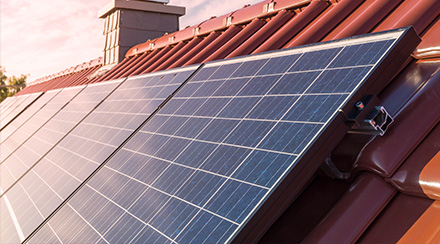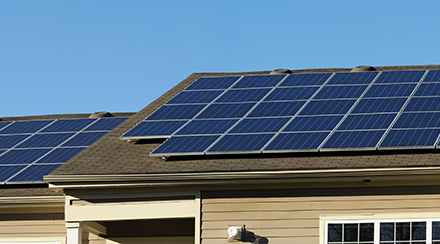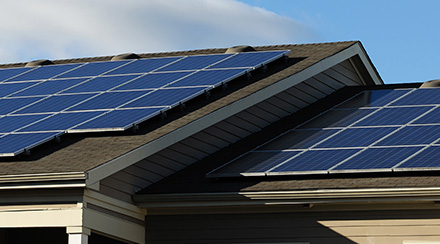How Do You Finance Solar Panels for Your Home?
Installing rooftop solar panels is an investment in your home, your financial future and our planet. But it can also be expensive in terms of upfront costs, and the typical homeowner may need to secure some type of financing before they can start saving money and helping the environment.*
Where Can I Get a Loan for Solar Panels?

Before you can get financing for the installation of solar panels, you must have at least an estimate of the total cost of your project. That means you must settle on a solar installer first. If financing is important to you, one of the criteria you can use to evaluate prospective solar installers is the level of financing assistance they offer.
Many solar installers do provide financing options, usually through third-party lenders. Some of the larger installers may offer in-house financing. Installers may also provide assistance with applications for tax rebates and financial incentives, which can vary by state and locality. We’ll get to those later.
Even if your installer offers financing, it’s a good idea to look around at other offers before making a decision. The best place to do this is with your own financial institution, or with other reputable banks or credit unions in your area.
Ask your bank or credit union if they offer solar loans designed for this specific purpose. If they don’t, find out if you qualify for a home improvement loan, home equity loan or home equity line of credit that you can use to purchase solar installation. You can also inquire about terms for personal loans.
Solar Financing Through Financial Institutions
Solar loans offered by financial institutions typically function like the home improvement loans you can use to finance a new roof or driveway. Their terms may vary, so you’ll want to collect as much information as you can to compare them to your other options.
- Home Equity Loan or Line of Credit - A home equity loan or line of credit may be a good option if you have accumulated equity in your home through months of timely mortgage payments. A home equity loan works similarly to a personal loan, with a fixed interest rate and repayment schedule. A home equity line of credit is more open-ended, allowing you to spend as needed up to your credit limit, usually with a variable interest rate. Both loan types allow you to borrow against your home equity, so the more equity you have in your home, the higher your limit will be.
- Personal Loan - A personal loan is not tied to your home equity, and whether you qualify (and at what rate) will often depend on your credit score and the amount you need to borrow. These loans will always have a fixed interest rate and repayment schedule.
The Finer Points of Solar Panel Financing
When deciding on your solar financing options, there are a few key factors you’ll want to consider:
- Interest Rate - The first thing you want to pay attention to is the interest rate. Obviously, the lower the rate, the more you’ll save.
- Repayment Schedule - The second factor to check is the repayment schedule. If it’s too short, your monthly payments could be too high for your budget. If it’s too long, you could spend more than you need to on interest. Figure out how much you can spend per month, and try to choose a loan with the shortest repayment schedule possible that keeps your payments under that amount.
- Electricity Savings - Don’t forget that you’ll be saving money on electricity once your solar array is up and running. Your solar installer should be able to give you an estimate of how much you should expect to save, which you can factor into your calculations when determining your ideal payment amount.
- Lender Benefits - Some lenders may have other bells and whistles to add, like price breaks for automatically scheduled payments, or a user-friendly online payment system. How heavily you want to weigh these factors is up to you.
Bundle Solar Financing When Buying a Home
If you’re shopping for a new home, there are some loans that allow you to bundle the cost of solar installation into a new home purchase. The FHA 203(k) loan and the Fannie Mae HomeStyle Renovation loan both make this possible, and may be easier to qualify for than personal or home improvement loans. These loans can also be used to refinance a home you’ve already purchased.
Can I Get a Solar Lease?

If you’ve evaluated all of your financing options and decided that you’re not quite ready to buy a solar array, there are two more options: solar leasing and power purchasing agreements, or PPAs.
With these options, you won’t actually own your solar panels, and you won’t qualify for tax breaks or incentives. But you will be able to have solar installed and maintained for a predictable monthly rate, and you can still generate clean energy and reduce your carbon footprint.
Are There Solar Tax Credits or Other Incentives?
To help encourage the adoption of residential solar, many government institutions offer tax breaks and incentives that make solar ownership more affordable.
The federal solar tax credit allows you to deduct a portion of your solar installation cost from your federal income tax liability. This won’t offset the amount of your installation right off the bat, but it will let you access savings that you can then apply to your solar loan payments. Congress determines how long this tax credit will last and at what rates; the Department of Energy website hosts information on the current terms.
State and local governments in some areas offer similar tax credits, as well as other financial incentives like cash rebates and property tax exemptions. You can inquire with your state and local governments about what incentives you qualify for, or ask your solar installer to point you in the right direction.
The upfront costs of solar installation may be beyond your budget, but with numerous financing options, it’s still a smart way to save money in the long run while making a difference for the health of our planet.
*Potential savings and environmental benefits vary depending on individual circumstances, such as your state of residence, availability of incentives and rebates, size of solar system, leasing versus financing, and other factors. Consider all factors carefully before making a decision. NRG and its affiliates do not provide tax, legal or accounting advice. This material has been prepared for informational purposes only, and is not intended to provide, and should not be relied on for, tax, legal or accounting advice. You should consult your own tax, legal and accounting advisors before engaging in any transaction.
Looking for Something Specific?
Select a category to find resources for topics that interest you.
Select Category

Related Articles:

What Is Solar Energy and How Does it Work?
Thanks to rapidly advancing technology, a growing share of our energy comes from renewable sources like wind, hydropower and solar. Learn about solar energy and how it provides for homes and communities.
Read Article
How Do Solar Panels Work?
Rooftop solar panels are among the most visible symbols of a new energy future that is cleaner, healthier and more renewable. But do you know how solar panels work?
Read Article
The Different Types of Solar Panels
When deciding what type of solar panel is best for your home, it’s worth taking the time to weigh the pros and cons of each panel type against your budget, climate and energy needs.
Read ArticleHow Do You Finance Solar Panels for Your Home?
Installing rooftop solar panels is an investment in your home, your financial future and our planet. But it can also be expensive in terms of upfront costs, and the typical homeowner may need to secure some type of financing before they can start saving money and helping the environment.*
Where Can I Get a Loan for Solar Panels?
Before you can get financing for the installation of solar panels, you must have at least an estimate of the total cost of your project. That means you must settle on a solar installer first. If financing is important to you, one of the criteria you can use to evaluate prospective solar installers is the level of financing assistance they offer.
Many solar installers do provide financing options, usually through third-party lenders. Some of the larger installers may offer in-house financing. Installers may also provide assistance with applications for tax rebates and financial incentives, which can vary by state and locality. We’ll get to those later.
Even if your installer offers financing, it’s a good idea to look around at other offers before making a decision. The best place to do this is with your own financial institution, or with other reputable banks or credit unions in your area.
Ask your bank or credit union if they offer solar loans designed for this specific purpose. If they don’t, find out if you qualify for a home improvement loan, home equity loan or home equity line of credit that you can use to purchase solar installation. You can also inquire about terms for personal loans.
Solar Financing Through Financial Institutions
Solar loans offered by financial institutions typically function like the home improvement loans you can use to finance a new roof or driveway. Their terms may vary, so you’ll want to collect as much information as you can to compare them to your other options.
- Home Equity Loan or Line of Credit - A home equity loan or line of credit may be a good option if you have accumulated equity in your home through months of timely mortgage payments. A home equity loan works similarly to a personal loan, with a fixed interest rate and repayment schedule. A home equity line of credit is more open-ended, allowing you to spend as needed up to your credit limit, usually with a variable interest rate. Both loan types allow you to borrow against your home equity, so the more equity you have in your home, the higher your limit will be.
- Personal Loan - A personal loan is not tied to your home equity, and whether you qualify (and at what rate) will often depend on your credit score and the amount you need to borrow. These loans will always have a fixed interest rate and repayment schedule.
The Finer Points of Solar Panel Financing
When deciding on your solar financing options, there are a few key factors you’ll want to consider:
- Interest Rate - The first thing you want to pay attention to is the interest rate. Obviously, the lower the rate, the more you’ll save.
- Repayment Schedule - The second factor to check is the repayment schedule. If it’s too short, your monthly payments could be too high for your budget. If it’s too long, you could spend more than you need to on interest. Figure out how much you can spend per month, and try to choose a loan with the shortest repayment schedule possible that keeps your payments under that amount.
- Electricity Savings - Don’t forget that you’ll be saving money on electricity once your solar array is up and running. Your solar installer should be able to give you an estimate of how much you should expect to save, which you can factor into your calculations when determining your ideal payment amount.
- Lender Benefits - Some lenders may have other bells and whistles to add, like price breaks for automatically scheduled payments, or a user-friendly online payment system. How heavily you want to weigh these factors is up to you.
Bundle Solar Financing When Buying a Home
If you’re shopping for a new home, there are some loans that allow you to bundle the cost of solar installation into a new home purchase. The FHA 203(k) loan and the Fannie Mae HomeStyle Renovation loan both make this possible, and may be easier to qualify for than personal or home improvement loans. These loans can also be used to refinance a home you’ve already purchased.
Can I Get a Solar Lease?
If you’ve evaluated all of your financing options and decided that you’re not quite ready to buy a solar array, there are two more options: solar leasing and power purchasing agreements, or PPAs.
With these options, you won’t actually own your solar panels, and you won’t qualify for tax breaks or incentives. But you will be able to have solar installed and maintained for a predictable monthly rate, and you can still generate clean energy and reduce your carbon footprint.
Are There Solar Tax Credits or Other Incentives?
To help encourage the adoption of residential solar, many government institutions offer tax breaks and incentives that make solar ownership more affordable.
The federal solar tax credit allows you to deduct a portion of your solar installation cost from your federal income tax liability. This won’t offset the amount of your installation right off the bat, but it will let you access savings that you can then apply to your solar loan payments. Congress determines how long this tax credit will last and at what rates; the Department of Energy website hosts information on the current terms.
State and local governments in some areas offer similar tax credits, as well as other financial incentives like cash rebates and property tax exemptions. You can inquire with your state and local governments about what incentives you qualify for, or ask your solar installer to point you in the right direction.
The upfront costs of solar installation may be beyond your budget, but with numerous financing options, it’s still a smart way to save money in the long run while making a difference for the health of our planet.
*Potential savings and environmental benefits vary depending on individual circumstances, such as your state of residence, availability of incentives and rebates, size of solar system, leasing versus financing, and other factors. Consider all factors carefully before making a decision. NRG and its affiliates do not provide tax, legal or accounting advice. This material has been prepared for informational purposes only, and is not intended to provide, and should not be relied on for, tax, legal or accounting advice. You should consult your own tax, legal and accounting advisors before engaging in any transaction.
Looking for Something Specific?
Select a category to find resources for topics that interest you.
Select Category

Related Articles:

What Is Solar Energy and How Does it Work?
Thanks to rapidly advancing technology, a growing share of our energy comes from renewable sources like wind, hydropower and solar. Learn about solar energy and how it provides for homes and communities.
Read Article
How Do Solar Panels Work?
Rooftop solar panels are among the most visible symbols of a new energy future that is cleaner, healthier and more renewable. But do you know how solar panels work?
Read Article
The Different Types of Solar Panels
When deciding what type of solar panel is best for your home, it’s worth taking the time to weigh the pros and cons of each panel type against your budget, climate and energy needs.
Read Article






